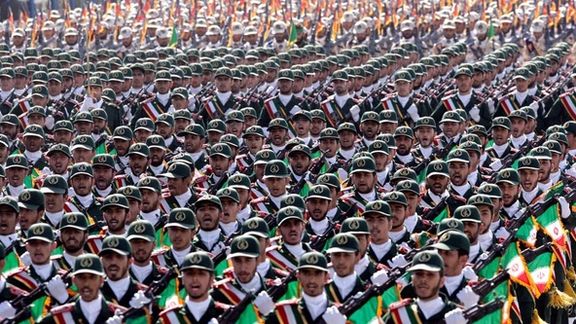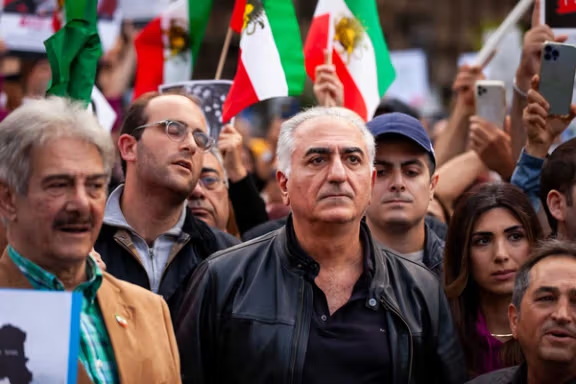No Legal Obstacles For EU To Sanction IRGC - Iran’s Prince

Iran’s exiled prince Reza Pahlavi citing a group of French-Iranian lawyers says there are no legal obstacles for the EU to sanction the Revolutionary Guard.

Iran’s exiled prince Reza Pahlavi citing a group of French-Iranian lawyers says there are no legal obstacles for the EU to sanction the Revolutionary Guard.
In a tweet on Sunday, Reza Pahlavi urged the European authorities to reconsider their current position and proscribe the IRGC as a terrorist group, based on a report the lawyers have presented to his office and heads of governments.
“Listing this entity, which is dedicated not to protecting Iran or Iranians but instead the power of the dictatorship, would be a strong and long-awaited recognition of reality and a show of support to my compatriots who are fighting for freedom and democracy in our country.”
Unlike the United States which in 2019 under former President Donald Trump put the IRGC on its Foreign Terrorist Organizations (FTO) list, European countries avoided the designation in the past few years and prioritized diplomacy with the Islamic Republic in the hope of concluding a nuclear deal.
Many politicians in France, Germany, and other European countries have been keen to pursue the IRGC’s designation by the EU and say that it has been long overdue. In January, the European Parliament approved a resolution with absolute majority to designate Iran’s Islamic Revolutionary Guard Corps (IRGC) as a terrorist organization. However, the EU refused to do so, with its Foreign Policy Chief Josep Borrell saying the move needs a ruling by a European court.
The document cited by Pahlavi refers to the Common Position adopted by the EU following the 9/11 attack, saying that the same definitions used to describe persons, groups and entities involved in that terrorist acts apply for the IRGC.

The legal report says a "terrorist act" shall mean any intentional act that may seriously damage a country or an international organization, seriously intimidating a population, or unduly compelling a government and seriously destabilizing or destroying the fundamental political, constitutional, economic or social structures of a country.
Having stated the statutes that provide the legal basis for listing an entity on the European list of terrorist organizations, the group of lawyers went on to provide examples of such acts by the IRGC to prove that the entity deserves to be designated, like all the other groups that the EU has blacklisted.
“The study of the IRGC confirms that it constitutes a structured organization which has carried out terrorist attacks and which has been the subject of decisions by competent authorities which the Council of the European Union could take into account in order to proceed with its inclusion on the European list of terrorist organizations,” read part of the document.
A noteworthy point in the document is the often-ignored duty of the IRGC according to the Islamic Republic’s Constitution: Exporting the revolution.
“The Constitution distinguishes the mission assigned to the IRGC to continue the Islamic Revolution, considering ultimately that the fall of the regime of the Shah of Iran and the establishment of the regime of the Islamic Republic do not constitute the end of the Islamic Revolution,” it reads, arguing that IRGC's mission to pursue the Islamic Revolution ideologically, beyond the borders of Iran may be among the main reasons behind its extra-territorial destabilizing activities.
Among the reasons that legally justifies the designation of the outfit, the document points out that the IRGC has planned and executed numerous operations aimed at assassinating Iranian opposition figures. “It also carried out attacks against foreign personalities and institutions that the Islamic Republic considered at the time as enemies or contrary to its interests,” added the document.
The documents also provided a long list of assassinations and terrorist acts tracing back to the IRGC as the cases that the EU can use to proscribe the group.
The cases include the assassination of Shapour Bakhtiar, the last prime minister of the Shah in 1991; assassination of Shahriar Shafiq, the nephew of the Shah of Iran, in 1979; the kidnapping of David Stuart Dodge, the president of the American University of Beirut, in 1982; attacks on the US Embassy and US Marines in Beirut in 1983; wave of attacks in Paris, 1985 and 1986; the Mykonos restaurant assassinations in 1992; and attack on AMIA in Argentina in 1994; as well as recent plots, such as the attempted assassination of John Bolton in 2022 and attempted assassination of opposition figure Masih Alinejad.
A presupposition prevailing throughout the text is that the European Union seeks to designate the IRGC and only lacks the proper legal bases, as proclaimed by Borrell. However, it seems that the reluctance to blacklist the IRGC is based on political reasons.
Talks in Vienna to revive the 2015 JCPOA nuclear deal came to an abrupt stop in 2022, reportedly for Iran’s insistence that the IRGC be removed from the US FTO list.